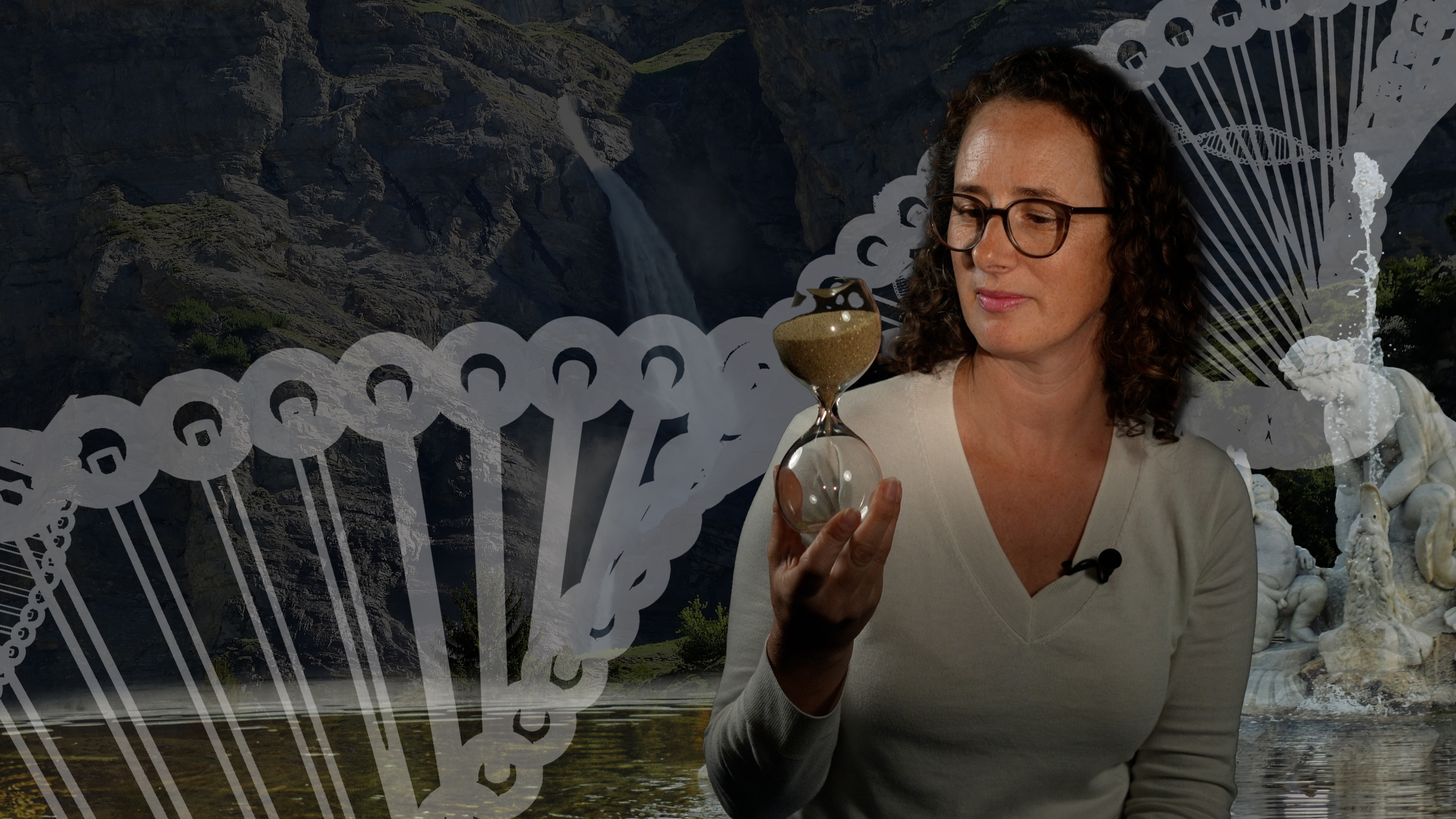
Can Saudi Arabia’s billions unlock the secrets to a longer, healthier life?

Longevity has been an underfunded area of biotech research, as the challenge of getting drugs approved and the high risk of failure have deterred most pharma giants and academic grant providers. Now, Saudi Arabia is throwing it a lifeline.
For nearly a decade, molecular biologist Johan Auwerx fought to get investors to back his theory that Urolithin A – a natural compound produced by our gut bacteria from food such as pomegranates and walnuts – holds the key to healthy ageing.
In 2016, Nature published a studyExternal link led by Auwerx, a professor in energy metabolism at the Swiss Federal Institute of Technology Lausanne (EPFL), showing that Urolithin A stimulates mitophagy, a process that clears out old or damaged mitochondria from our cells, and helps maintain muscle function as we age. After six weeks, mice injected with a daily dose of Urolithin A were running faster and farther on a treadmill. Worms that received the treatment lived 45% longer.
Although Auwerx secured grants and minor rounds of financing to pay for a few small-scale human tests, he struggled to secure the millions needed for large clinical trials that could give Urolithin A the scientific credibility to become a mainstay in medicine cabinets.
People have been searching for the secrets to longevity for centuries. Huge advances in the science of ageing and technology such as AI in the last decade have given scientists reason to believe we are on the cusp of a major breakthrough. This has fuelled a new longevity movement with clinics and companies popping up in many parts of the world such as Saudi Arabia, the US and Switzerland, offering sophisticated tests, novel therapies, and a world of promises.
Switzerland has been a key player in the pursuit of eternal youth dating back centuries when people came from across the globe to experience the healing powers of its thermal baths. Swiss wellness clinics, scientists, investors and pharmaceutical companies have all advanced the longevity field. But how much is the latest longevity trend just hype and good marketing? Can we really extend our lifespan and why do we want to?
This article is part of a series investigating the growing longevity trend and Switzerland’s role in it. You can find all the articles and videos in the series at the bottom of this article.
“The problem with the ageing field is that no one does a rigorous clinical trial because no one is willing to invest in natural products,” Auwerx told Swissinfo. “This has led to a lot of semi-science, which gives a bad impression of the ageing field and has made it even more difficult to get funding.”
But his prospects – and those of longevity researchers around the world – have received a boost from an unlikely funding source: Saudi Arabia. In 2018 Crown Prince Mohammed bin Salman announced plans to create the first global foundation dedicated to developing therapies that extend healthy lifespan. Three years later, the Hevolution Foundation was born with a budget of up to $1 billion (CHF800 million) a year, making it the world’s second-largest funder of geroscience, the study of the biological mechanisms of ageing.
>> Read more about a Basel-based scientist’s longevity breakthrough

More
The Basel researcher whose work triggered a longevity revolution
By early 2025 the Riyadh-based foundation, which has some of the world’s top ageing scientists and biotech entrepreneurs on its executive team and scientific panel, had doled out $400 million in grants, partnerships and investments to support 250 scientists around the world.
Swiss researchers and companies are among the beneficiaries. The foundation’s first four investments in start-ups included Lausanne-based Vandria, which is developing treatments for age-related diseases based on Auwerx’s discoveries on mitophagy. The company secured investments from Hevolution, Dolby Family Ventures and ND Capital as part of a series A funding round that raised $30.7 million.
Timeline, another company Auwerx is involved with that sells Urolithin A as a supplement, is one of 40 semi-finalists in XPRIZE Healthspan – a seven-year, global competition to develop new therapies that restore muscle, cognitive and immune function by at least ten years in people aged 50 to 80. Hevolution is the single-largest backer of the initiative, bankrolling $40 million of the $101 million prize money.
“Ageing is the climate change crisis of human biology,” said William Greene, a US-trained physician and entrepreneur who is now the chief investment officer at Hevolution. “We’re living longer, but we’re not living more healthily. In fact, the number of years that we live with debilitating chronic disease has accelerated and expanded even as we live longer.”
The lack of large-scale funding to commercialise innovations in the biology of ageing means that “anyone who seeks to have real impact in the world can have real impact in this field”, Greene said.
Filling a funding gap
Saudi Arabia’s emergence as a major player in longevity is part of a larger push to diversify its economy away from a dependence on fossil fuels.
In 2016 the world’s second-biggest oil producer launched Vision 2030, a blueprint to establish the country as a global leader in sectors including healthcare, renewable energy, technology, and even sport.
Under the VisionExternal link, Saudi Arabia, which has no track record in the pharmaceutical industry, aims to become a leading biotech hub in the Middle East by 2030External link and globally by 2040. While this is a challenge in areas such as cancer research, where the US and Europe are way ahead, the cash-starved longevity field is a different story.
The budget of the US National Institute on Aging (NIA), the world’s largest public funder of ageing research, almost tripledExternal link to $4.4 billion in 2024 from $1.6 billion in 2016External link. However, $2.6 billion of that was spent on Alzheimer’s disease and other neuroscience areas. Basic ageing biology received only $400 million. These figures pale in comparison with the overall $47 billion budget of the US National Institutes of Health, which funds the NIA.
>> Read here about how Swiss pharma giant Novartis is investing in research on ageing

More
Novartis bets on ageing as next frontier in drug development
Although the Swiss government has supported numerous research projects on ageing, the field has not been given a dedicated National Centre of Competence in Research, a key funding instrument aimed at strengthening strategic research in areas of national importance.
Longevity is also drawing in private funding. Companies that aim to extend healthspan or develop drugs based on ageing biology received financingExternal link of $8.49 billion in 2024, according to the latest annual report from Longevity Technology, an internet platform covering investment in the industry. Although that was more than double the $3.82 billion across 331 deals in 2023, it is still a drop in the ocean compared with financing on other biotech areas, which the report estimated to be around $90 billion last year.
The longevity dilemma
There are several explanations for the lacklustre funding. One is the complexity of ageing itself. Companies and billionaire-backed start-ups that have tried to develop anti-ageing drugs and treatments have come up short.
“One big reason investors and big pharma are hesitant to engage in longevity is simply the poor rate of successful drug development in the field,” said Mikka Cabral, a senior consultant at Alcimed, a management consulting firm that focuses on innovative sectors.
“The more moonshot the ideas, the harder it is to get investors on board,” said Marc P. Bernegger, a Swiss entrepreneur who co-founded Maximon, an investment firm focused on longevity products which hosts an annual longevity investor conference in the Swiss mountain resort of Gstaad. “Some companies involved in research don’t even use the word longevity because they worry they can’t get hardcore funding from venture capital investors.”
Another factor is the absence of a regulatory pathway to get an anti-ageing drug approved in the US, the world’s biggest pharmaceuticals market, because ageing isn’t classified as a treatable disease. That means reimbursement from insurers or state medical systems isn’t possible, making it difficult to generate multi-billion-dollar sales and earn a solid return on investment.
“The regulatory framework is very clear that in order to prove anything in this world, you must have a disease indication, and a clinical trial design,” said Sergey Jakimov, a founding partner at longevity venture fund LongeVC. “People have been investing in shiny theses like curing ageing. That’s a great idea, but it doesn’t work for venture capital.”
>> Read here about the rise of longevity clinics in Switzerland

More
Longevity clinics: modern-day snake oil or the key to healthy ageing?
This has led many scientists involved in longevity research to redirect their efforts to the discovery of new compounds for specific age-related diseases that hold more promise for profit. Meanwhile potential breakthroughs on the basic science of what happens when we age, and investigations into natural products such as Urolithin A, that don’t have years of patent protection, have struggled to find long-term financing.
Welcome newcomer?
Saudi Arabia’s arrival has given longevity a much-needed shot in the arm. “It’s pretty unprecedented what Hevolution has done,” said Jakimov. “You haven’t had any initiatives that were willing to commit $1 billion plus to longevity.”
The foundation has also distinguished itself with its approach. It hasn’t awarded grants for research into specific diseases, which is more common in the field, but has instead focused on the basic biology of ageing and the discovery of practical solutions that delay or prevent multiple diseases.
On the investment side, it aims to make early-stage companies more attractive for big pharma and investors by shouldering more of the risks and investing over a longer horizon than most private equity and venture capital funds.
“We can take judicious technical risk,” Greene said. “We really want to explore biology and experimental medicine and that’s a little bit earlier stage investing than maybe the average venture capitalist is comfortable with.”
A portion of the grants are also reserved for Saudi scientists as a way to build up the country’s own biotech expertise.
“Biotech is not just the purview of south San Francisco and Cambridge,” said Greene. “It’s flourishing in other places and there’s no reason it can’t flourish anywhere where there is talent, ambition and good science, including in Saudi Arabia.”
Although Saudi Arabia’s money has been welcomed in many quarters, it also has its detractors. Human rights campaigners such as Human Rights Watch have raised concernsExternal link about rights abuses, crackdowns on freedom of the press, and limits on free speech in the Kingdom.
Many people who spoke to Swissinfo acknowledged these concerns and said that they were taken into consideration ahead of involvement with Hevolution.
“We discussed funding sources in general, but even for a lot of (venture capital) funds we don’t know who the limited partners are and where their money comes from,” said Klaus Dugi, CEO of Vandria. “We want to apply the money we receive to address unmet medical needs and help patients live better lives.”
Although Hevolution initially took a high-profile approach, it has become largely silent over the past few months. The last call for grant applications published on the foundation’s website is dated October 2024.
Just prior to publication of this article, sources with knowledge of the matter told Swissinfo that the Hevolution Foundation is undergoing internal changes that could affect the disbursement of grants. In an emailed response, a spokesperson said the foundation “is working through internal budgeting processes” and that “the timing of this may create challenges for those depending on our support”. He added that “we are doing all we can to work expeditiously”.
The foundation remains dedicated to the “vision of extending healthy lifespan” and is fully committed to continue supporting grants and investments that “incentivise independent research and entrepreneurship,” he wrote.

More
How Switzerland became a longevity hot spot
The spokesperson said this was part of “its annual internal governance and administrative process”, but some sources suggested delays in grant approvals and disbursements could be due to the upheaval in biomedical research funding in the US. President Donald Trump has slashed the budget of the NIH, affecting thousands of grants including many in the ageing field.
Hevolution has funded several US based institutions that also receive NIH grants, including the Buck Institute for Research on Aging and the Albert Einstein College of Medicine.
If the foundation retreats after promising so much, it could deal a severe blow to longevity research.
“It’s often the case with ageing initiatives that they go big and then they die,” said Auwerx. “I hope it’s not going to happen to this one.”
Additional reporting by May Elmahdi-Lichtsteiner.
Edited by Nerys Avery/vm/ts
More

In compliance with the JTI standards
More: SWI swissinfo.ch certified by the Journalism Trust Initiative































You can find an overview of ongoing debates with our journalists here . Please join us!
If you want to start a conversation about a topic raised in this article or want to report factual errors, email us at english@swissinfo.ch.